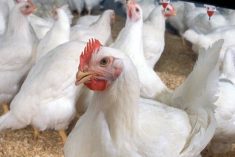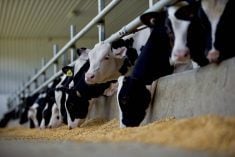WINNIPEG — Livestock producers are no longer able to feed their animals antibiotics for growth purposes now that Health Canada has restricted the use of antibiotics for livestock as a way of curbing drug-resistance.
However, these new restrictions aren’t a concern to most members of the livestock industry.
“We’re quite supportive of the moves in Health Canada that the industry was making in terms of removing the growth promotion claims from the antibiotic labels,” said Steve Leech, the national program manager at Chicken Farmers of Canada. “There are a number of antibiotics which do have labels for growth promotion, and those labels will be removed.”
Read Also

CBOT Weekly: China, shutdown guiding the market
The United States grain and oilseed markets are currently dominated by two factors, said Ryan Ettner, broker with Allendale Inc. in McHenry, Ill. Ettner said those are the absence of a trade deal with China and the ongoing United States government shutdown.
Antibiotics can be given to livestock, whether through feed, water or injection, as a way to make the animal grow bigger, faster. However, many in the livestock industry say they do not use antibiotics for this purpose anyway. Leech says it really isn’t a concern to the Canadian poultry industry, because most Canadian chicken producers use antibiotics only as a way of preventing or treating disease, he says.
“I think there would be a very small, small minority of uses that would be affected,” said Leech.
The antibiotic restriction doesn’t have a huge impact on the Canadian beef industry, either.
“For the beef industry, that’s never really been a significant issue,” said Rob McNabb, general manager of the Canadian Cattlemen’s Association. “We have antimicrobials that have no connection to a human product. That’s our growth promotion as far as an antimicrobial, it’s not an antibiotic per se.”
McNabb says that as long as the antibiotics are available for treatment purposes, the beef industry has little to be concerned about.
“As long as those products are still available for the treatment of disease by a veterinarian, then we don’t have any significant issues at all with having the (growth) promotion label removed from any of the medically important products,” said McNabb.
McNabb added that the beef industry had a good track record with antimicrobial use, and it intend son keeping it that way.
“The beef side of agriculture or food production has a very good record, in fact an excellent record, of a prudent use of antimicrobials so that it’s not showing up in product residue,” said McNabb. “There’s some contribution to AMR (antimicrobial resistance) but I think just by the nature of the way our animals are treated or not treated in the case of mass medication, I think we’ve got a pretty good track record of not contributing significantly to AMR.”














